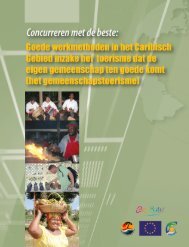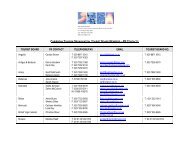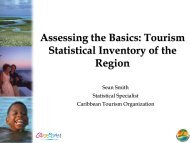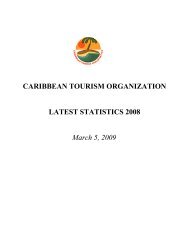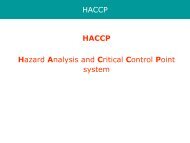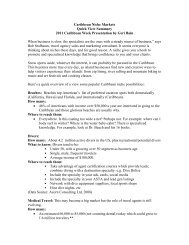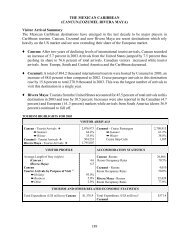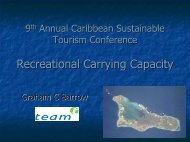Disaster Risk Management Strategy and Plan of Action - Caribbean ...
Disaster Risk Management Strategy and Plan of Action - Caribbean ...
Disaster Risk Management Strategy and Plan of Action - Caribbean ...
Create successful ePaper yourself
Turn your PDF publications into a flip-book with our unique Google optimized e-Paper software.
Regional <strong>Disaster</strong> <strong>Risk</strong> <strong>Management</strong> <strong>Strategy</strong> for the Tourism Sector in the <strong>Caribbean</strong> – Final<br />
to international, regional <strong>and</strong> national shocks <strong>and</strong> disruptions caused by wars, financial crises, terrorism,<br />
strikes, <strong>and</strong> diseases outbreaks.<br />
The United Nations World Tourism Organization (UNWTO) has described tourism as a vector <strong>and</strong> victim<br />
<strong>of</strong> climate change. Experts recognize that the environment including the climate is a tourism resource, <strong>and</strong><br />
the industry is highly susceptible to the impact <strong>of</strong> climate change <strong>and</strong> increased warming.<br />
Climate change <strong>and</strong> global warming has been attributed with causing an increase in storm surges, coastal<br />
erosion, coral bleaching, sea level rise <strong>and</strong> more severe weather patterns- hotter periods, droughts,<br />
increased rainfall <strong>and</strong> increased intensities <strong>of</strong> hurricanes <strong>and</strong> the concomitant flooding, mudslides <strong>and</strong> sadly<br />
loss <strong>of</strong> life <strong>and</strong> livelihoods. There have been too many acute examples <strong>of</strong> this across the <strong>Caribbean</strong> in<br />
recent history <strong>and</strong> consequently the need for this DRM <strong>Strategy</strong> <strong>and</strong> <strong>Plan</strong> <strong>of</strong> <strong>Action</strong> for the Tourism Sector<br />
in the <strong>Caribbean</strong> is further justified.<br />
The Davis Declaration advocates, while recognizing the role <strong>of</strong> tourism in poverty alleviation, that “there is<br />
a need to urgently adopt a range <strong>of</strong> policies which encourages truly sustainable Tourism that reflects a quadruple bottom line <strong>of</strong><br />
environmental, social, economic <strong>and</strong> climate responsiveness”. The pressure is now on for the industry to “rapidly<br />
respond to climate change within the evolving Unit Nations (UN) framework <strong>and</strong> progressively reduce its Greenhouse Gas<br />
(GHG) emissions if it is to grow in a sustainable manner.” While the <strong>Caribbean</strong> is considered a miniscule<br />
contributor to GHG emissions it has been <strong>and</strong> will be significantly impacted by global warming. The<br />
<strong>Caribbean</strong> region has been identified by the UNWTO, the United Nations Environmental Programme<br />
(UNEP) <strong>and</strong> the World Metrological Organization (WMO) as a climate change vulnerability hotspot.<br />
Climate change adaptation <strong>and</strong> mitigation for the tourism industry is therefore critically important for<br />
sustainable development in the <strong>Caribbean</strong>.<br />
When the tourism industry is negatively impacted by natural hazards the domino effect for the region is a<br />
decline in agriculture, manufacturing, transportation, financial services <strong>and</strong> a whole host <strong>of</strong> services in the<br />
economy that are vital linkages to the tourism industry. The sustainability <strong>of</strong> the <strong>Caribbean</strong> tourism sector<br />
therefore equates to the sustainability <strong>of</strong> the <strong>Caribbean</strong> <strong>and</strong> securing the economic, social, cultural <strong>and</strong><br />
environmental assets <strong>of</strong> the region.<br />
The <strong>Caribbean</strong> <strong>and</strong> in particular the wider <strong>Caribbean</strong> is comprised <strong>of</strong> both isl<strong>and</strong> states <strong>and</strong> l<strong>and</strong>mass<br />
territories. By that very description <strong>of</strong> the makeup <strong>of</strong> the <strong>Caribbean</strong> it is evident that natural hazard<br />
experienced in the <strong>Caribbean</strong> region are also varied. The most common <strong>of</strong> these hazards are hurricane,<br />
earthquake, volcanic, flood <strong>and</strong> drought. The region also suffers periodically from storm surges <strong>and</strong><br />
l<strong>and</strong>slides.<br />
It is reasonable to say that DRM in the tourism sector also faces these challenges above. In addition, the<br />
sector plays a significant role after the occurrence <strong>of</strong> an event or disaster, <strong>and</strong> how response <strong>and</strong> recovery<br />
ensue is critical. The tourism sector is expected to rebound quickly from an event or disaster <strong>and</strong>, at the<br />
same time, communicate to the world that the destination is open for business. The purpose <strong>of</strong> this is also<br />
to create revenue to help with the recovery process.<br />
In determining the likely impacts <strong>of</strong> hazards, the complex <strong>and</strong> related reactions from the societal,<br />
environmental <strong>and</strong> economic elements are as important as underst<strong>and</strong>ing the event itself. Approaching<br />
DRM requires a new way <strong>of</strong> thinking for the <strong>Caribbean</strong>. It requires a new modus oper<strong>and</strong>i as well. The<br />
<strong>Caribbean</strong> has experienced challenges in terms <strong>of</strong> collaboration – both within countries <strong>and</strong> across<br />
territories. <strong>Plan</strong>ning for events <strong>and</strong> disasters <strong>and</strong> more particularly ensuring quick recovery from an event<br />
or disaster requires high levels <strong>of</strong> cooperation <strong>and</strong> trust.<br />
5





